

Babies are born with flat feet, but in a few years, this usually corrects itself. The arch begins to develop, and by the time they are 5 or 6 years old, most children have normal arches. Around 15-20 percent may have flexible flat feet by that age, which is generally painless and not considered to be a serious condition. However, in certain cases, a parent may want to pay attention to their child’s flat feet. First is if your child complains or demonstrates foot pain, and second is if one foot is flat and the other is not. Third is if the child’s feet seem to be getting flatter. And fourth is if the child has difficulty walking, running, or participating in sports. Treatment for problems of flat feet in children includes finding footwear that provides the necessary support. Other ways to treat a child’s flat feet are foot exercises that stretch and strengthen the feet, and wearing foot orthotics. Engaging in certain activities, such as hopping, swimming, and balance exercises, can also help. If you are concerned about how flat feet may be affecting your child, it is suggested that you make an appointment with a podiatrist for a full examination.
Flatfoot is a condition many people suffer from. If you have flat feet, contact Dr. Stephan J. LaPointe from Georgia Foot & Ankle Specialists . Our doctor will treat your foot and ankle needs.
What Are Flat Feet?
Flatfoot is a condition in which the arch of the foot is depressed and the sole of the foot is almost completely in contact with the ground. About 20-30% of the population generally has flat feet because their arches never formed during growth.
Conditions & Problems:
Having flat feet makes it difficult to run or walk because of the stress placed on the ankles.
Alignment – The general alignment of your legs can be disrupted, because the ankles move inward which can cause major discomfort.
Knees – If you have complications with your knees, flat feet can be a contributor to arthritis in that area.
Symptoms
Treatment
If you are experiencing pain and stress on the foot you may weaken the posterior tibial tendon, which runs around the inside of the ankle.
If you have any questions please feel free to contact our office located in Rome, GA . We offer the newest diagnostic and treatment technologies for all your foot and ankle needs.
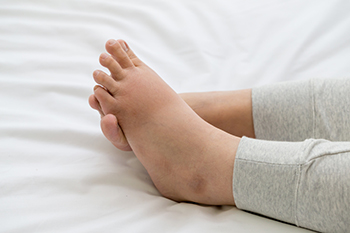
Many women experience discomfort during their pregnancy, and their feet are often affected. Foot pain and swelling often happen in the second or third trimester, making it difficult to complete daily tasks. The noticeable weight gain may cause plantar fasciitis to develop, as a result of the extra weight the heel and arches have to bear. This is a condition that targets the plantar fascia and causes it to become torn or inflamed. Edema is the medical term for swollen feet and is common among pregnant women. It happens from the extra fluids that the body naturally produces to support the growing fetus, and may pool in the feet and ankles. Foot pain may be managed by performing daily stretches which can help to increase blood flow and diminish soreness. Swollen feet may be helped by reducing sodium intake, and drinking plenty of water daily. If your pregnancy causes you to have foot pain or swollen feet, it is suggested that you speak to a podiatrist who can offer you additional relief options.
Pregnant women with swollen feet can be treated with a variety of different methods that are readily available. For more information about other cures for swollen feet during pregnancy, consult with Dr. Stephan J. LaPointe from Georgia Foot & Ankle Specialists . Our doctor will attend to all of your foot and ankle needs.
What Foot Problems Can Arise During Pregnancy?
One problem that can occur is overpronation, which occurs when the arch of the foot flattens and tends to roll inward. This can cause pain and discomfort in your heels while you’re walking or even just standing up, trying to support your baby.
Another problem is edema, or swelling in the extremities. This often affects the feet during pregnancy but tends to occur in the later stages.
How Can I Keep My Feet Healthy During Pregnancy?
If you have any questions please feel free to contact our office located in Rome, GA . We offer the newest diagnostic and treatment technologies for all your foot and ankle needs.

A broken foot is painful. It generally happens suddenly from falling and is considered a common type of injury. Bruising, severe pain, and swelling often accompany a broken foot, and the range of motion can be limited. Walking is difficult, if not impossible, and prompt medical attention is typically sought for relief. Dropping a heavy object on the foot is also a common cause of a broken foot, and the severity of the break may depend on the angle the object was dropped from. People who frequently participate in sporting activities may endure a broken foot, and soccer players may be prone to incurring this type of fracture from kicking the ball. A diagnosis consisting of having an X-ray taken can be performed, followed by beginning the correct treatment. Most people who have broken footwear have a cast or protective boot until it has healed, which can take several weeks. If you have broken your foot, it is suggested that you speak with a podiatrist who can correctly diagnose and treat this condition.
A broken foot requires immediate medical attention and treatment. If you need your feet checked, contact Dr. Stephan J. LaPointe from Georgia Foot & Ankle Specialists . Our doctor can provide the care you need to keep you pain-free and on your feet.
Broken Foot Causes, Symptoms, and Treatment
A broken foot is caused by one of the bones in the foot typically breaking when bended, crushed, or stretched beyond its natural capabilities. Usually the location of the fracture indicates how the break occurred, whether it was through an object, fall, or any other type of injury.
Common Symptoms of Broken Feet:
Those that suspect they have a broken foot shoot seek urgent medical attention where a medical professional could diagnose the severity.
Treatment for broken bones varies depending on the cause, severity and location. Some will require the use of splints, casts or crutches while others could even involve surgery to repair the broken bones. Personal care includes the use of ice and keeping the foot stabilized and elevated.
If you have any questions please feel free to contact our office located in Rome, GA . We offer the newest diagnostic and treatment technologies for all your foot and ankle needs.
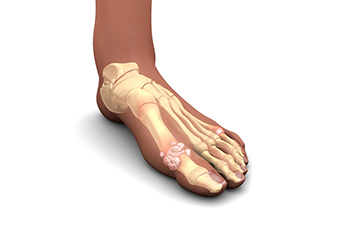
Anyone is at risk for getting the foot condition that is known as gout, despite it being more prevalent among men. The chances may increase in women after menopause, and it generally does not happen before then. Existing medical conditions may lead to developing gout, including obesity, alcoholism, and high blood pressure. A genetic history may also contribute to getting gout, in addition to eating foods that have high levels of purines. These types of foods consist of red meat, shellfish, and drinks that are made with large amounts of sugar. The purines convert to uric acid in the blood, and excess uric acid turns to crystals which can lodge in the joints of the big toe. This can cause debilitating pain, and it may be so severe it can be difficult to walk up steps. If you have had one or more bouts of gout, it is strongly suggested that you are under the care of a podiatrist who can effectively treat this condition.
Gout is a foot condition that requires certain treatment and care. If you are seeking treatment, contact Dr. Stephan J. LaPointe from Georgia Foot & Ankle Specialists . Our doctor will treat your foot and ankle needs.
What Is Gout?
Gout is a type of arthritis caused by a buildup of uric acid in the bloodstream. It often develops in the foot, especially the big toe area, although it can manifest in other parts of the body as well. Gout can make walking and standing very painful and is especially common in diabetics and the obese.
People typically get gout because of a poor diet. Genetic predisposition is also a factor. The children of parents who have had gout frequently have a chance of developing it themselves.
Gout can easily be identified by redness and inflammation of the big toe and the surrounding areas of the foot. Other symptoms include extreme fatigue, joint pain, and running high fevers. Sometimes corticosteroid drugs can be prescribed to treat gout, but the best way to combat this disease is to get more exercise and eat a better diet.
If you have any questions please feel free to contact our office located in Rome, GA . We offer the newest diagnostic and treatment technologies for all your foot and ankle needs.
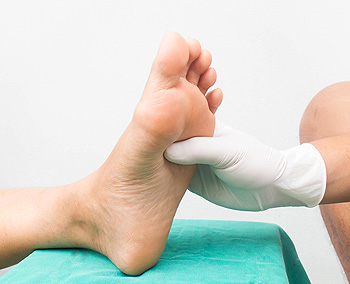
The majority of diabetic patients understand the importance of maintaining good foot care. Neuropathy is a common condition that can develop in people who have diabetes, and it is defined as the inability to feel existing cuts or wounds that have developed on the feet. Having elevated amounts of glucose levels in the blood may lead to poor circulation and nerve damage, possibly causing severe pain and foot ulcers to develop. Proper foot care begins daily with washing and drying the feet, followed by inspecting the soles with a mirror. This is an effective way to notice if any cuts have developed, and a family member or caregiver may help to accomplish this. It is beneficial to have toenails trimmed weekly, which may be helpful in preventing an ingrown toenail from developing. The feet need as much protection as possible, and this can be done by wearing comfortable shoes, in addition to refraining from walking barefoot. If you have diabetes, it is strongly suggested that you are under the care of a podiatrist who can help you to manage this condition and offer additional prevention techniques for maximum foot protection.
Diabetic foot care is important in preventing foot ailments such as ulcers. If you are suffering from diabetes or have any other concerns about your feet, contact Dr. Stephan J. LaPointe from Georgia Foot & Ankle Specialists . Our doctor can provide the care you need to keep you pain-free and on your feet.
Diabetic Foot Care
Diabetes affects millions of people every year. The condition can damage blood vessels in many parts of the body, especially the feet. Because of this, taking care of your feet is essential if you have diabetes, and having a podiatrist help monitor your foot health is highly recommended.
The Importance of Caring for Your Feet
Patients with diabetes should have their doctor monitor their blood levels, as blood sugar levels play such a huge role in diabetic care. Monitoring these levels on a regular basis is highly advised.
It is always best to inform your healthcare professional of any concerns you may have regarding your feet, especially for diabetic patients. Early treatment and routine foot examinations are keys to maintaining proper health, especially because severe complications can arise if proper treatment is not applied.
If you have any questions please feel free to contact our office located in Rome, GA . We offer the newest diagnostic and treatment technologies for all your foot and ankle needs.
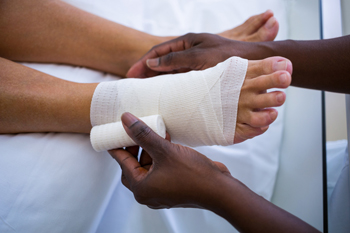
The majority of minor foot wounds are easily treated. It can begin with stopping any bleeding, and by applying pressure to it. The next step is cleaning it thoroughly by using tap water, followed by covering it with a sterile dressing. It is beneficial to use waterproof dressings so people can easily bathe or shower. Diabetic patients often develop wounds they cannot feel, generally as a result of nerve damage diabetes can cause. Wounds on these types of patients can become severe quickly, and the urgency of maintaining proper wound care is crucial in protecting the foot. There are some wounds that can be painful, and it may be helpful to take over-the-counter pain medicine, which can provide temporary relief. If you would like more information about how to care for wounds on the feet, it is suggested that you confer with a podiatrist who can provide you with helpful tips.
Wound care is an important part in dealing with diabetes. If you have diabetes and a foot wound or would like more information about wound care for diabetics, consult with Dr. Stephan J. LaPointe from Georgia Foot & Ankle Specialists . Our doctor will assess your condition and provide you with quality foot and ankle treatment.
What Is Wound Care?
Wound care is the practice of taking proper care of a wound. This can range from the smallest to the largest of wounds. While everyone can benefit from proper wound care, it is much more important for diabetics. Diabetics often suffer from poor blood circulation which causes wounds to heal much slower than they would in a non-diabetic.
What Is the Importance of Wound Care?
While it may not seem apparent with small ulcers on the foot, for diabetics, any size ulcer can become infected. Diabetics often also suffer from neuropathy, or nerve loss. This means they might not even feel when they have an ulcer on their foot. If the wound becomes severely infected, amputation may be necessary. Therefore, it is of the upmost importance to properly care for any and all foot wounds.
How to Care for Wounds
The best way to care for foot wounds is to prevent them. For diabetics, this means daily inspections of the feet for any signs of abnormalities or ulcers. It is also recommended to see a podiatrist several times a year for a foot inspection. If you do have an ulcer, run the wound under water to clear dirt from the wound; then apply antibiotic ointment to the wound and cover with a bandage. Bandages should be changed daily and keeping pressure off the wound is smart. It is advised to see a podiatrist, who can keep an eye on it.
If you have any questions, please feel free to contact our office located in Rome, GA . We offer the newest diagnostic and treatment technologies for all your foot care needs.
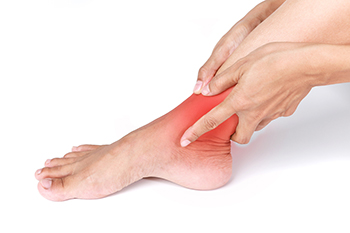
There are several symptoms that accompany ankle pain, including stiffness, pain, and swelling. Ankle pain can happen for various reasons, such as a fall, a direct blow to the ankle, or if it suddenly twists beyond its normal range of motion. An existing medical condition can cause the muscles surrounding the ankle joint to weaken, which may lead to having ankle pain. Many people have difficulty walking with ankle pain, and choose to wrap their ankle with an elastic bandage. This is often successful in providing stability as it heals. Relief may be found when the affected foot is frequently elevated, and it is beneficial to avoid standing for long periods of time. If you have ankle pain, it is suggested that you speak with a podiatrist who can determine how severe it is, in addition to offering you correct treatment options.
Ankle pain can be caused by a number of problems and may be potentially serious. If you have ankle pain, consult with Dr. Stephan J. LaPointe from Georgia Foot & Ankle Specialists . Our doctor will assess your condition and provide you with quality foot and ankle treatment.
Ankle pain is any condition that causes pain in the ankle. Due to the fact that the ankle consists of tendons, muscles, bones, and ligaments, ankle pain can come from a number of different conditions.
Causes
The most common causes of ankle pain include:
Symptoms
Symptoms of ankle injury vary based upon the condition. Pain may include general pain and discomfort, swelling, aching, redness, bruising, burning or stabbing sensations, and/or loss of sensation.
Diagnosis
Due to the wide variety of potential causes of ankle pain, podiatrists will utilize a number of different methods to properly diagnose ankle pain. This can include asking for personal and family medical histories and of any recent injuries. Further diagnosis may include sensation tests, a physical examination, and potentially x-rays or other imaging tests.
Treatment
Just as the range of causes varies widely, so do treatments. Some more common treatments are rest, ice packs, keeping pressure off the foot, orthotics and braces, medication for inflammation and pain, and surgery.
If you have any questions, please feel free to contact our office located in Rome, GA . We offer the newest diagnostic and treatment technologies for all your foot care needs.
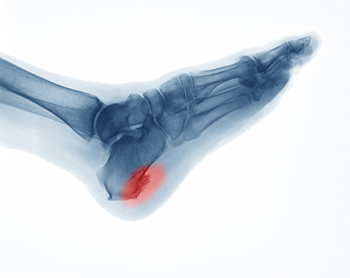
Bone spurs can form on any joint, but the feet are a common location, especially for patients who are 60 years old or above. The reason for this is that bone spurs, medically known as osteophytes, generally take years to grow. They are most often found on the ankle, heel, or big toe. Bone spurs form when bones rub against each other, which is generally the result of wear and tear of a joint, combined with the loss of the cartilage that separates the bones. People with osteoarthritis frequently develop bone spurs. Young athletes may develop bone spurs from injuries that occur during sports. Symptoms of a bone spur include aching pain that worsens with activity, swelling, tingling and numbness, or stiffness. In many cases, however, bone spurs may form without displaying any symptoms at all. An X-ray is thought to be the best way to determine if you have a bone spur. Treatment for bone spurs may include wearing protective padding in the shoes, having cortisone injections, losing weight, and doing certain foot exercises. In some cases, surgery may be a remedy. For more information on how to deal with bone spurs, it is suggested that you visit a podiatrist.
Foot Pain
Foot pain can be extremely painful and debilitating. If you have a foot pain, consult with Dr. Stephan J. LaPointe from Georgia Foot & Ankle Specialists . Our doctor will assess your condition and provide you with quality foot and ankle treatment.
Causes
Foot pain is a very broad condition that could be caused by one or more ailments. The most common include:
Diagnosis
To figure out the cause of foot pain, podiatrists utilize several different methods. This can range from simple visual inspections and sensation tests to X-rays and MRI scans. Prior medical history, family medical history, and any recent physical traumatic events will all be taken into consideration for a proper diagnosis.
Treatment
Treatment depends upon the cause of the foot pain. Whether it is resting, staying off the foot, or having surgery; podiatrists have a number of treatment options available for foot pain.
If you have any questions, please feel free to contact our office located in Rome, GA . We offer the newest diagnostic and treatment technologies for all your foot care needs.